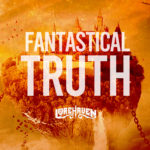Reading Is Worship 2: Experience-Worship
Idols may not be able to move, but they’re hard to pin down. Just as soon as you shut down one series of machinery rolling the little statues off the conveyor belt, the heart increases production on an emergency backup assembly line.
 You know what else is easy? Criticizing competing idol outlet malls. That’s my temptation as I start this series: first define worship, then go after others’ wrong worship modes.
You know what else is easy? Criticizing competing idol outlet malls. That’s my temptation as I start this series: first define worship, then go after others’ wrong worship modes.
- Celebrities. Worshiping rock-star authors rather than the Author. One problem: the Christian-speculative market is still very small, and our most-popular authors (Lewis, Tolkien, etc.) are no longer living. I could point to other genres — “secular” speculative stories, Christian-romance paperbacks, etc. — but that’s a tangent.
- Niche appeal. “I love spec stories because they’re weird!” Been there, critiqued that.
- Author pyramid schemes. This is closely related to “celebrity.” Even honoring great actors, singers, or novelists would be “purer” if we were sincerely lauding their work. Instead we also want to take their place. “Hannah Montana” (recall that?) would never have been what it was without this projection complex. (She’s so pretty and popular! [Exclamatory textspeak acronym!] I wish I were her myself!) Yet I’ve also already addressed that, as it pertains to potential author pyramid schemes.
Maybe I’ll (re-)explore those in later series episodes. Yet I was leaning first in the direction that commentator Teddi Deppner reinforced yesterday: that for most readers, including myself, the worst potential idol in enjoying speculative stories may be experience.
Idol identified: experience
Without Teddi’s clarity, I might have called this story-worship. However, I doubt that would be accurate. If I’m truly enjoying the story, I cannot worship it. I’m instead desiring the deeper Beauty and Truth the story reflects, and therefore also the Author of that Beauty and Truth. C. S. Lewis would call this looking along the light-beam into the Source.
By contrast, I may be tempted to “[serve] the creature rather than the Creator” (Romans 1:25). But with stories, I’m really serving/worshiping personal experience.
This not only displeases God, but is silly and self-defeating, if you think about it.

It took me a while to learn this: Worrying overmuch about hand “placement” defeats the whole point of praise.
Consider singing-worship in a church service. When I was younger, I would ponder how this magic was done. How did worship “work”? Was it a quiet and somber, “reverential” attitude — a state of Highly Spiritual Quiet Meditation? Was it self-abandon to the point of going insane, like those (supposedly) nutter-bar charismatics? Should I cry? Not cry? Arrange theology in my head? Get lost in some other experiential emotion?
All of that misses the means for the end. For me, it took sermons and good books to define Biblical worship. It is not about experience, or rather not about striving for experience, they said. Instead experience naturally arrives when we’re lost in the wonder, beauty, love, and holiness of God, which can only result from knowing Him better, thanks to His own Word.
Or consider breathing. Try to breathe. Go on, do it. If you don’t keep breathing, you’ll die. (This experiment is more effective during a sleepless night.) Breathe in, breathe out. Keep up that breathing. What happens? Breathing becomes a chore, an almost painful labor.
Living for experience alone will frustrate. You keep craving more and more experience — and thus miss seeing the eternal reality the experience of a truly fantastic story reflects.
Cure: eyes on eternity
Let’s say I receive a new book by an author I know is great. I burn through the book in two days, including a late-night reading binge until 2 a.m. Whew, what a rush. That story-world was amazing and so beautifully described. The plot kept me guessing. The characters — I wish they were real! Such a hero’s courage is just who we could use now, and the leading lady was so strong yet beautiful. Villains were defeated, and peace and glory was restored to the world. Then comes an inevitable sigh and cry: why can’t reality be more like this?
 The Epic Story answers: Reality will be. Read Scripture about resurrection — of Christ, souls/spirits, human bodies, and “the creation itself” (Romans 8). Great stories echo eternity. All great story experiences should point us to the Creator.
The Epic Story answers: Reality will be. Read Scripture about resurrection — of Christ, souls/spirits, human bodies, and “the creation itself” (Romans 8). Great stories echo eternity. All great story experiences should point us to the Creator.
And in His presence, nearer thanks to Christ taking away our separating sin, we worship.
I’m still convinced “optimal” worship may not always be conscious (after all, creation does this). Yet we may even offer a prayer after a story’s experience. Not to sound devotional-cheesy here, but something like: Author of reality, thank You for this experience. Thank You that it reflects hope that You will defeat evil and restore peace and glory to the world. Thank You for these emotions. Even when I’m not thinking of You and Your Name, let me honor You.
How do you avoid possible experience-worship in your enjoyment of speculative stories?











































This seems to me to be looking for sin with a microscope. Using the “if it doesn’t have a tail it’s not a monkey” trope again, how does this extend to the rest of life? Are all pleasurable personal experiences sin, if we enjoy them as such? Even if we’re not consciously worshiping? Is cooking dinner for the pleasure of seeing your family eat an act of self-worship and therefore sin? How about relaxing in a comfy chair? Or talking to a friend?
Taking this to its logical conclusion, ought we to avoid all pleasurable experiences, because through them we might be tempted to self-worship and therefore sin? Should we become like those monks who practice self-flagellation and extreme poverty so that no pleasurable experiences come between them and God? Where does one draw the line?
If reading speculative fiction makes you sin, then don’t read it. Period.
Hello again, Kessie!
For the purpose of this series, I must admit I am assuming a few things. I’d hoped by this point my views on “Christian Hedonism” would be known. Perhaps they’re not!
But maybe repeating this will help, near the end this very column:
And this, from last week’s column?
What I mean by this is: I’m convinced genuine worship may happen even when we don’t know it, throughout all those good pleasures you mentioned, including story enjoyment. This doesn’t come from wishful thinking, or authors such as C. S. Lewis (though Lewis was one of the best to expound upon it, such as his mirror-universe reflection on pure human pleasure in The Screwtape Letters). It comes from Scripture. I reason like this, to a conclusion with which you would surely agree:
Here’s an example. Moments ago I was “psyching myself” up for this morning’s editing and writing with one of the more wondrous music I’ve ever discovered, and even better, recently: tracks from the Christian Irish synth/pop/Celtic group Iona. Wow. This beautiful music makes my eyes water. Moments ago, I wasn’t praying, but I felt on the edge of prayer. Let me think further … images came to my mind. Vast landscapes, glorious colors, flying, wind, soaring at incredible speeds. That’s how I think of New Earth. That’s how I think of the eternity Christ will someday bring.
Also in this activity, which could count as a holy pleasure, I don’t believe I was sinning at all. But similar to your thought about looking for sin with a microscope, it seems silly even to ask the question: was that a sin? Huh? Huh? It sounds like navel-gazing. Like (to use my own example) reminding myself to breathe, in and out, rather than simply getting lost in wondrous life and doing what comes naturally.
I write this series, though, because worship doesn’t come naturally to us, not yet. It doesn’t come from angst and navel-gazing, either.
True worship comes from believing, loving, and personally joining God’s Epic Story of redemption — of our souls from sin, and later, the creation itself. And it also comes from honest, pure, even “subconscious” pleasures like story, art, and more.
To me, Biblical evaluation of these doesn’t challenge pleasure. It enhances it. Cheap pleasure is exchanged for true pleasure — intense, passionate, meaningful, earthly.
This is a tough topic to write about. “Worship” is something most Christians assume they understand, but which has subtleties that are both difficult to pin down and vital to grasp. After all, Commandment #1 in the class Old Testament line-up is “You shall have no other god before Me.” If it weren’t so important, I’d agree it isn’t worth going after with a microscope.
What it boils down to in my mind is an awareness of His omnipresence. Always with me. Who is with me? The Creator. The Source. The One who delights in me and in my delight in Him. The jealous One who is also a consuming fire. The abundantly generous One who gives wisdom to the simple without taking them to task for needing it.
This awareness, this “practicing of His presence” as Brother Lawrence is often quoted about, is more than just a mental acknowledgement. It should transform everything. If the Mighty One is with me, of whom shall I be afraid? Therefore, if I detect fear in my heart, I know I’m not truly “knowing Him” as Mighty, or as Loving and willing to get me through.
Everything about the human experience tempts us to replace Him with some lesser substitute. He made food and gave us taste buds — the temptation is to gluttony, to glorify the ecstasy of amazing food and the satisfaction it brings. He made sex and gave us bodies that enjoy it — the temptation is to pursue this bliss outside of the guidelines He gave us to keep it safe and to use it to enhance relationship.
It may seem nit-picky to examine our hearts so deeply, but there are times when we need to ask ourselves, “What does my life truly say about my relationship with Him?” Whether we like it or not, how we use our money reflects on our relationship with Him. How we treat our families and friends — and enemies — reflects on whether or not we truly know Him. How I spend my time shows how much my allegiance goes to gratifying myself and how much to living for Him.
Jesus said that there will be those who object, “But, Lord, I did all these things FOR YOU!” And yet He will say, “Go away — I never knew you.” Kinda makes me think it’s worth pondering the motives of my hearts, in everything I do. If my conscience is clear, then great! If I feel convicted to seek Him more passionately in certain areas, all the better!
Thanks for the discussion, Stephen. Oh, and I’m glad my comment helped! When you mentioned me in today’s post, it felt like we’d been talking over coffee or something — great way to build community. The group of writers and commenters here is a pleasure to interact with.
Stephen,
I had to read this post twice to make sure I understood what you are writing about. And your question, “How do you avoid possible experience-worship in your enjoyment of speculative stories?” is a good one.
Well, I was thinking about my favorite novels, Winter’s Tale by Mark Helprin and David Copperfield by Dickens and I truly loved those books and can remember various scenes from them and they pop into mind from time to time. I still have to realize that they are stories (while having some deep truths about love in Winter’s Tale & manhood in David Copperfield) and keep them in that proper context.
I believe as human beings, we will always have the need to worship something outside of ourselves because of that God-shaped void that exists inside of us.
Finally, I believe we have to keep a proper perspective about experience and not let a great story or great music or even great sermon create a new reality for us.
Our imaginations are powerful and when they are touched it can take us to places are wonderful and even soul-lifting…but on the other side of the coin they can lead us into delusion as well.
However, thanks for bring into light the worship is not just praise music but it can be other forms of art and hopefully this post will bring deeper though on what that will ultimately mean.
Marion
I’m sure that’s true in context, because we have to live in this reality, and denying reality would be refusing our divine call, refusing to do good and to follow Christ.
But I do want escape from this reality, and that is pretty much the main reason I read speculative fiction. I must not turn away from my duty in this reality, but this reality is not good enough. I’m not satisfied. I would rather have a fantasy world be real, where honor is truly recognized even by fallen humans, and good and evil may be more clearly seen and known. I would rather have a science fiction universe be real, where adventure really is unlimited, where there really are endless possibilities, instead of stifling, stale, disappointing modern life. I’d rather have a destiny than a “career”.
Maybe I wrongly worship the experience of escapism from time to time. I probably do, at least every now and then, because I’m a flawed human, and I probably get everything at least partially wrong. But I deeply need to get lost in the other worlds that I encounter in fantasy novels, movies, and games. Reality is dull and depressing, and I have to believe that in some ways, speculative worlds are more real.
Just of note: when I say experience-worship, I mean sinful worship of experience.
That’s far different from the Biblical, God-exalting, and perhaps even subconscious redemptive activity of worship through experience or experience that is worship.
Thanks much for everyone’s thoughts thus far! I’ve no doubt I will learn more from you, thanks to your wisdom.
By the way, this topic reminds me of things I’ve heard about people who jump from church conference to church conference, always looking to “feel God” and experience the emotional high of good music that “leads me into His presence”. Or the Pentecostals who go to revival meetings, seeking to “feel God” through some physical sensation or “falling under His power” or having someone tell them a “prophetic word” from God.
Are any of those things wrong or sinful? Not to instigate any doctrinal wars, but no, not generally speaking. God sometimes chooses to manifest in supernatural ways, even in our modern day times. Sometimes we may feel warmth in our bodies during worship, or “tingly bubbles” or even fall prostrate like those in the Bible who “fell as though dead” when they encountered God in the Old and New Testaments. I used to be pretty skeptical about that stuff, but have had some experiences that have changed my mind.
However, the instant we shift our pursuit away from Him, Himself, we are in idolatry. It’s subtle. Sometimes we don’t realize we’re doing it. After all, how many of those desperate revival-goers are telling themselves they’re after the “high” of it? No, they think they are pursuing God. They say they are pursuing His presence. So how do I know that they might be off-base?
Because His Word makes clear that He is always with us. And when we begin to think that we have to pursue something else — for example, performing up to a certain standard, or going to a certain conference with certain music, reading certain books or listening to certain preachers — in order to experience His presence, then we have missed it.
Of course, this comment is related but a bit far out from the direct discussion of story-reading-as-worship. I’m just getting a lot out of pondering this concept of how we experience God and how everything we do can be worship, might even be worship whether we know it or not. From the New Testament, I get the impression there are only two ways to live a moment: in the flesh or in the Spirit. So it seems appropriate to ask myself, “When I read this book, am I doing it in the flesh or in the Spirit? How would I know the difference?”
I’m afraid something like this is one of my main struggles with worship.. It’s so easy to get pulled into admiring the truths in the story and wishing to live like that that we forget that we will–incidentally, that’s why I try to avoid mainstream fiction. Nothing about that makes me go “YAH! NEW EARTH GLIMPSE!~”
[…] (I try to define rightful worship here, and began exploring false worships, idolatry, here.) […]